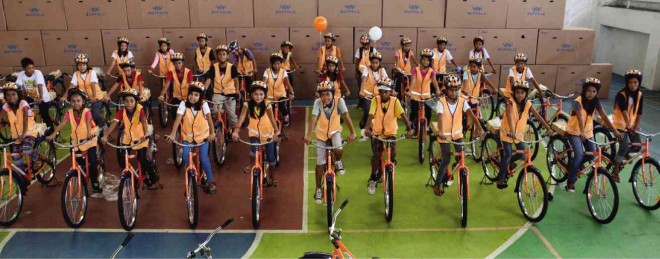
NO MORE WALKING With their new bikes, students from four public high schools in Botolan and Cabangan towns in Zambales province will find it easier and faster to reach their schools, regardless of the terrain and weather. CONTRIBUTED PHOTO
Getting to school seems an everyday challenge for 13-year-old Jesus Domulot of Botolan town in Zambales province. No matter what the weather is like, he has to spend about 30 minutes of walking along rough, sometimes muddy, road to catch his first class in the morning.
By the time he reaches school, he is either drenched in sweat during summer or wet from the rain during the monsoon season.
The Grade 8 student of New Taugtog National High School says he does not mind the grueling travel by foot during school days. Growing up in a remote Aeta community has acquainted him with arduous treks from their shanty in Sitio Bihawo in Barangay (village) Villar in Botolan to elsewhere.
Despite the tiring journey, Domulot says he will continue to endure this hardship if only to finish his studies and eventually become a seafarer.
Faster and safer
The boy’s perseverance is what inspires Dutch financial institution ING Bank to give him a bicycle that he can use to get to school “faster and safer.”
Domulot and 589 other high school students in their province will soon pedal their way to schools through ING Bank’s “Orange Bike” project, which is now on its second year after its launch in Isabela province in October 2013.
The five-year project will benefit 5,000 children from select Asian countries, says Mark Newman, chief executive officer of ING Commercial Banking Asia.
With the help of its nonprofit partner World Vision, ING Bank has taken this project to four high schools in Zambales to benefit students who live far from their schools, according to Catherine Low, country manager of ING Bank Singapore.
Many students become “exhausted and hungry” after walking to school for an hour, Low says, adding that this often makes it difficult for them to concentrate in class.
“We would like to give these children a chance to have a brighter future by providing them a tool for them to reach their full potential,” she says during the distribution of the bicycles held at the Cabangan Sports Complex in neighboring Cabangan town.
The project, she says, aims to help beneficiary students from Cabangan National High School, Panan National High School, New Taugtog High School and Botolan National High School to improve their school attendance and their academic performance.
No ordinary bicycle
“This bicycle is not an ordinary bicycle. It is a tool to improve someone’s life. It is the strongest bicycle you will ever see in the world and it is designed for rural conditions,” says Brian Berkhout, director of World Bicycle Relief, an international nongovernment organization that facilitates the supply of bikes to the beneficiaries.
Josaias de la Cruz, national director of World Vision Philippines, recognizes the generosity of ING Bank, noting that the “bicycle is a very large part of the culture of The Netherlands as much as the windmills and the tulips.”
“We know that if a Dutchman gives a bicycle, it is a gift from the heart because it comes with many fond memories of childhood and years of riding on a bicycle to school,” De la Cruz says.
“By providing bikes, ING Bank is hoping to spare the children from their daily arduous walk to school on sometimes wet or dusty road,” says Consuelo Garcia, country manager of ING Bank in the Philippines.
Garcia notes that ING Bank and its employees in Asia contributed their own money and raised funds for the project by initiating activities such as charity lunch in Singapore and a cross-country bicycle tour in Thailand.
Education for all
Zenia Mostoles, acting schools division superintendent in Zambales, says the project helps the local government realize education for all, especially in remote areas.
Jose Dimayuga, head of ING Bank Manila’s corporate and financial institutions, says that through the project, they could also help improve the livelihood of the children’s families when the bikes are used during nonschool days.
“The bicycle can carry a load of 200 kg and is custom-built for tough rural conditions,” he says.
He says ING Bank has chosen a bicycle for the project because of the long cycling tradition of Dutch people, and orange because it is the national color of The Netherlands.
World Bicycle Relief will train community-based mechanics on the proper repair and maintenance of the bicycles.
School principals, parents, teachers and village officials who are part of the project’s bicycle supervisory committee will also help oversee the project’s implementation and ensure its success, Dimayuga says.
Jolina Jugatan, 15, another beneficiary student from New Taugtog National High School, says it excites her to finally ride her new bike to school. “The bicycle will help us reach our school faster and easier,” she says.